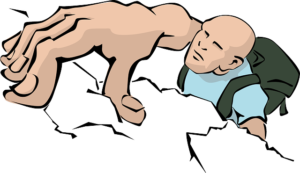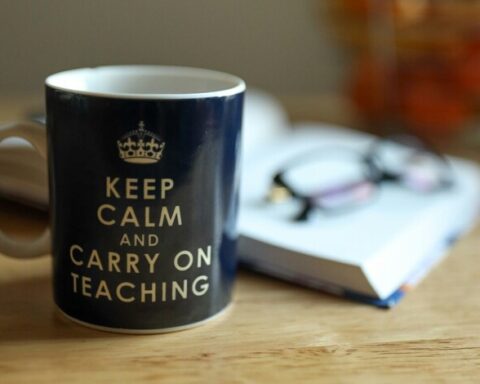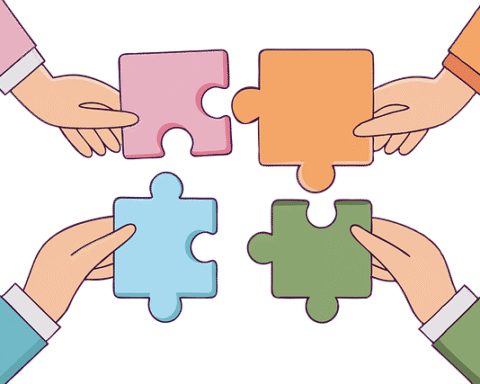With language teaching and coaching increasingly overlapping, being able to help your clients grow professionally is a valuable skill to have. At his recent Inter-ELTA workshop, Jeff Aristy spilled the tea on how to advance your own career and that of your clients using the C(O)RE model.
Quite the New Yorker, Jeff Aristy sure doesn’t waste time: this fast-paced workshop was just the right mix of information, activities and vibrant discussion. Only fair: the model he was presenting (originally created by Bo Graesborg in his book “C(O)RE or The Boaching Guide to Career Success”) is for people who are ready for new insights and growth in their personal and professional lives.
What’s your C(O)RE, and why is the O in brackets?
The acronym C(O)RE stands for four different key areas related to professional life, namely:
- Competence
- Opportunity
- Relationships
- Enterprise
While all of these are career-related, they are not always balanced:
We discussed that within corporate culture, there generally appears to be an over-reliance on competency/being good at what you do (C), at the expense of the other dimensions.
For example, building close relationships (R) can be met with a certain suspicion: it may seem effortless, at times inauthentic, and overrated (when in reality, it’s a soft skill worth cultivating). The result is a strong “C” and a weak “R”. On the other hand, in some cultures, it is possible to make up for a weak C with a strong R, because those place a higher value on relationships.
Opportunity (O) involves luck and external factors that are not fully within your control (hence the brackets). However, developing the O means preparing the ground for these to happen (through serendipity, networking, relationships, etc.), and learning to recognize and seize the right opportunities.
Finally, Enterprise (E) is about your most personal interests and passions. It helps you lead yourself and others, and can inspire you to make big career changes. Unlike R and C, E comes with self-knowledge and is to be discovered rather than actively developed.
So why does the C(O)RE model matter, and why is it advisable to strengthen all of the four aspects, and not just be a master of your chosen craft?
What got you here won’t get you there
The importance of the C(O)RE model lies in the fact that the skills that got you started won’t necessarily help you advance your career. Jeff gave us a video game analogy: what you need in order to succeed changes with each level.
Over the course of the game, you may need:
- special boots to climb a mountain
- a person who helps you
- an energy drink
- a sword
Likewise, you need different kinds of tools to get ahead in your professional life. Jeff had us discuss the question “What got you here?” in a breakout session. We came to find that what got us where we are today was a mixture of factors, including opportunity, relationships and curiosity.
Too much of a good thing can get in the way
To further illustrate the importance of using different tools, we discussed an example:
Daniel, a very competent corporate employee, sees an interesting job opening at his company. In theory, he’s the perfect match, and he thinks that his boss should notice and offer him the job. However, he ends up losing the opportunity to a less qualified colleague with better people skills.
Daniel’s mistake was relying too much on his competence (C), while ignoring relationships (R) and ways of seizing the opportunity at hand (O): He waited to get noticed instead of making his intentions known, so nobody knew he was interested in the job. If he had reached out to his superior, he might have stood a chance.
It is clear from this that developing your C(O)RE also means developing corporate intelligence and asking yourself these questions:
“Who makes decisions?”
“Who should I get in touch/build relationships with?”
Another factor was that Daniel was very good at what he was doing, so his company was happy for him to stay where he was. Thus, being a specialist can potentially make it harder for you to make a career change (conversely, being a generalist that is happy to wear many hats can be a real advantage).
Finding your E, finding your Why
Standing for Enterprise, the last letter in the C(O)RE model is about your motivation, interests and vision. As Jeff pointed out, it is something to be discovered rather than developed. It’s all about getting to know yourself better. Finding your biggest motivator and focusing your energy is an ongoing process, and you are the hero(ine) of your own journey when it comes to your E.
Jeff asked us:
“What gets you out of bed in the morning?”
If you have trouble answering the question, you can try to start observing yourself and what you enjoy (yes, the little things count as well). Being curious about yourself is the key to moving closer towards your E.
On the other hand, if your answer includes lots of responsibilities that make your head spin and bills to pay, there is much energy and motivation there (and likely a sense of being overwhelmed), but maybe not enough focus and emotional support. Finding someone who has your back and provides a sense of safety (such as a coach) can make a huge difference in terms of outlook and direction.
Jeff also made the point that goal-setting can have its pitfalls (the goals might be too big, poorly defined, difficult to obtain or not measurable). So one tip he gave us was to focus on change instead of fixed goals.
Example:
- Goal: “I want to lose ten kilos, so I’ll start doing everything I can to achieve that goal… running, gym, whatever.”
- Change: “I want to be more active – if I lose ten kilos, great, but the key here is to adopt changes in my life irrespective of the goal.”
The advantage of the latter approach is that the changes don’t have to be huge, and that the outcome is more flexible and progress-oriented than achieving a precise goal that becomes meaningless once you’ve achieved it. So, it is more of an open-ended journey of discovery that helps you get to know yourself better (and thus develop your E).
Takeaways from the workshop
We found out that with the help of the C(O)RE model, you can assist your clients through:
- Finding out what areas of their C(O)RE would benefit from being developed
- Helping your clients strengthen those areas
For example, someone with a strong C may have trouble finding clients or a new position. You could help them develop their R by helping to improve their people skills, such as becoming a great listener and really understanding their clients’ needs. You could also help them develop corporate intelligence – knowing how to identify the right people and build relationships with them. (A bonus tip for introverts was creating comfortable networking situations by giving oneself a task, or showing other people something.)
Likewise, when your client is looking for a new job, R will help them get to know their future boss and peers, whom they’ll have to work and make decisions with. Interpersonal skills are a way of finding out who and what is compatible with them and their values, and what isn’t. They also open doors when you least expect it.
You could also work with clients on recognizing and seizing opportunities (O), cheer them on when they need it and help them build leadership skills (E). And finally, keep in mind that making gains in one area will have a positive impact on the other areas as well, as they are all interconnected.
This was an unusual, interactive workshop with multiple perspectives on professional development. We left happy and energized, with new insights and things to try out.
***
Jeff is the founder and Managing Director of GrowWerk GmbH, a training, coaching and consulting company based in Munich, Germany. He has made interpersonal and intrapersonal skills a cornerstone of his training work. You can find Jeff on growwerk.com.
Recommended reading
Bo Graesborg: “C(O)RE or The Boaching Guide to Career Success”
Susan Cain: “Quiet” (a book about career development for introverts)
Susan Scott: “Fierce Conversations” (a book about trustbuilding and authentic conversations leading to high levels of engagement)
Sandra is ELTABB's Chair and the current editor of the ELTABB journal. She holds an MA in English and is passionate about brain-friendly language learning and teaching. Likes Shakespeare and Venetian lute music.









